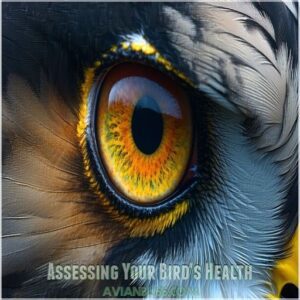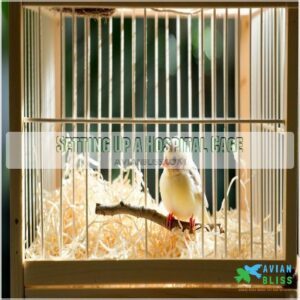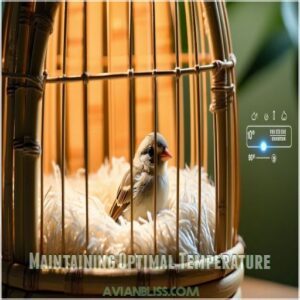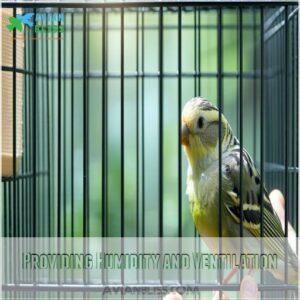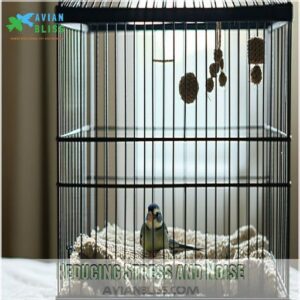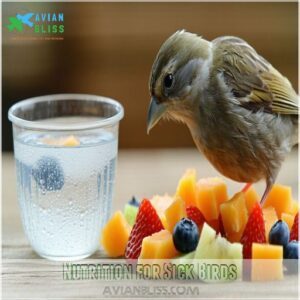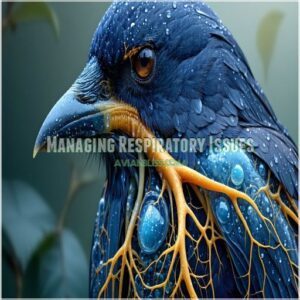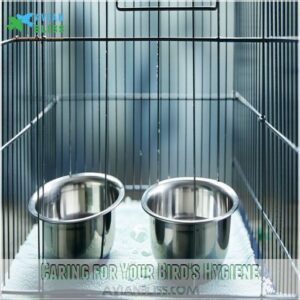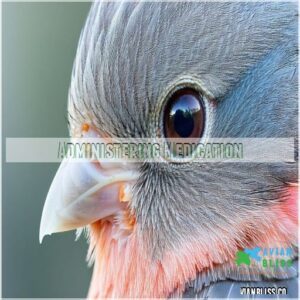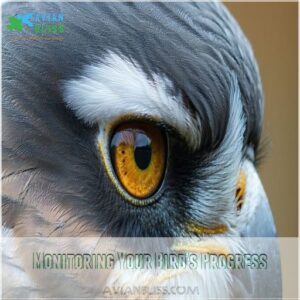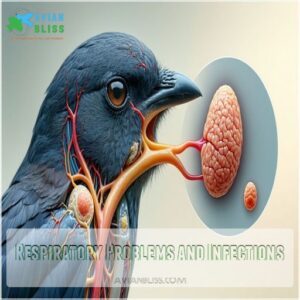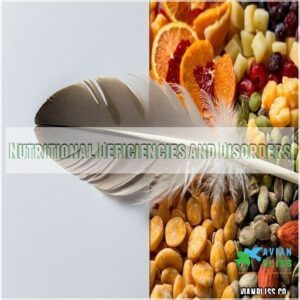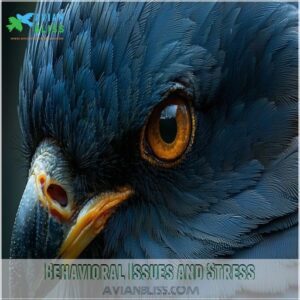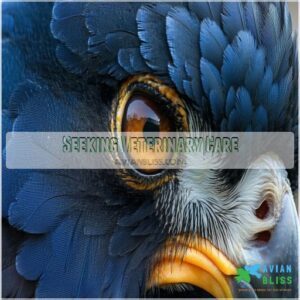This site is supported by our readers. We may earn a commission, at no cost to you, if you purchase through links.
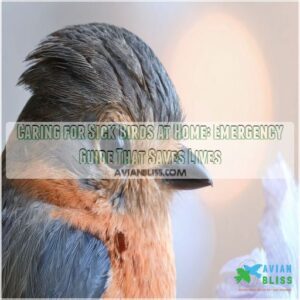
Create a cozy, warm hospital cage away from drafts, keeping the temperature around 85-90°F.
Offer soft, easy-to-digest foods and fresh water, and consider Pedialyte for dehydration.
Keep the environment quiet and stress-free, cleaning the cage daily with bird-safe disinfectants. Administer any medications as your vet directs, using a gentle touch.
Remember, your quick response and tender care can make all the difference in your feathered friend’s recovery.
Table Of Contents
- Key Takeaways
- Assessing Your Bird’s Health
- Creating a Safe Environment
- Nutrition for Sick Birds
- Managing Respiratory Issues
- Caring for Your Bird’s Hygiene
- Administering Medication
- Monitoring Your Bird’s Progress
- Common Health Issues in Birds
- Seeking Veterinary Care
- Frequently Asked Questions (FAQs)
- Can a sick bird get better on its own?
- What do you give a bird when they are sick?
- How can I help my bird with respiratory problems at home?
- Is it OK to touch a sick bird?
- How long should a sick bird quarantine?
- Can household stress impact bird recovery?
- When is hand-feeding necessary for sick birds?
- Are home remedies safe for birds?
- What signals emergency veterinary bird care?
- Conclusion
Key Takeaways
- You’ll need to act fast when your bird’s sick – monitor their temperature, keep them warm (around 90°F), and create a quiet, stress-free environment to support their recovery.
- Hydration and nutrition are critical – offer soft, easy-to-digest foods, use Pedialyte for electrolytes, and always have fresh water available to prevent dehydration.
- Watch for warning signs like changes in breathing, lethargy, ruffled feathers, and unusual droppings that could indicate serious health issues requiring immediate veterinary attention.
- Maintain strict hygiene by cleaning the cage daily, disinfecting food and water dishes, and removing waste promptly to prevent the spread of infection and support your bird’s healing process.
Assessing Your Bird’s Health
As a bird owner, you’ll need to become a keen observer of your feathered friend’s health, looking for subtle changes in behavior, appearance, and energy levels.
Quick recognition of illness symptoms can mean the difference between a swift recovery and a serious health crisis.
So it’s vital to learn how to assess your bird’s condition accurately and respond with confidence.
Identifying Signs of Illness
Spotting a sick bird can feel like unraveling a mystery. Watch for telltale signs like lethargy, unusual feather ruffling, and appetite loss.
Changes in breathing or droppings signal potential bird illness. Recognizing bird illness symptoms, such as respiratory or digestive issues, is also key to early detection, as outlined in common bird illness symptoms.
Your keen observation is essential – if something seems off, trust your instincts. These subtle symptoms could be early warnings of a health issue that needs immediate attention. Early detection is crucial.
Recognizing Respiratory Problems
When your feathered friend starts struggling to breathe, it’s time to tune into their respiratory warning signs.
Watch for wheezing, clicking sounds, or nasal discharge that signal serious respiratory issues. Open-beak breathing and labored movements aren’t just quirks—they’re red flags demanding your immediate attention.
These sick bird symptoms could indicate a critical health challenge that needs swift action.
Exposure to certain airborne substances, such as bird dander and mold, can also pose health risks to humans, so it’s critical that you take precautions when caring for sick birds.
Monitoring Temperature and Humidity
In the thick of bird health concerns, monitoring your feathered friend’s temperature and humidity becomes a critical lifeline.
A precise thermometer helps you maintain the ideal cage temperature between 85-90°F, while a reliable humidifier keeps respiratory conditions in check.
Watch for subtle temperature fluctuations that could stress your sick bird’s delicate system and compromise recovery.
Detecting Dehydration
Because dehydration can sneak up on your feathered friend, watch for telltale signs like a dry, flaky beak and sunken eyes.
Lethargy signals trouble – your bird might seem less perky than usual.
Reduced droppings and decreased water intake are red flags.
Act fast: check hydration levels by gently pinching your bird’s skin to test elasticity, and consult your vet immediately if you suspect dehydration.
Creating a Safe Environment
When your bird is sick, you’ll need to create a safe, nurturing environment that supports healing and reduces stress.
Your primary goal is to set up a comfortable hospital cage.
controlled temperature, minimal noise, and ideal conditions that’ll give your feathered friend the best chance at recovery.
Setting Up a Hospital Cage
Your sick bird needs a sanctuary that’s more than just a cage—it’s a healing haven.
Choose a smaller, draft-free space with smooth, easy-to-clean surfaces.
Lower the perch to just inches from the ground, so your feathered friend can rest without struggling.
Select safe, non-toxic materials that won’t compromise recovery, creating a protective nest for gentle healing. Consider a cage with proper ventilation, which is key to preventing respiratory issues in birds.
Maintaining Optimal Temperature
Now that you’ve set up a cozy hospital cage, maintaining the right temperature becomes your bird’s lifeline.
Heat lamps or heating pads work wonders, but watch the thermometer closely.
Aim for a steady 90°F, creating a gentle warmth without overheating. Position the heat source to create a temperature gradient, giving your feathered friend a chance to move and regulate its own comfort. 90°F
Providing Humidity and Ventilation
Proper humidity and ventilation can make or break a sick bird’s recovery journey.
Careful airflow management supports respiratory health through three critical steps:
- Use a humidifier to maintain 55% ambient moisture
- Provide gentle, draft-free air circulation
- Position the cage away from direct air currents
Monitoring humidity levels helps prevent respiratory complications and supports your feathered friend’s healing process.
Reducing Stress and Noise
After maintaining the right humidity, create a quiet cage sanctuary that shields your sick bird from overwhelming stimuli.
Dim the lighting, play soft background music at low volumes, and handle your feathered friend with utmost gentleness.
Minimize disturbances by keeping the area peaceful, reducing bird stress, and promoting a calm, stress-free environment that supports healing.
Nutrition for Sick Birds
When your feathered friend is under the weather, their nutrition becomes your top priority for recovery.
You’ll need to focus on offering easy-to-digest foods, fresh water, and electrolytes.
That’ll help your bird regain strength and fight off illness.
Offering Fresh Water and Electrolytes
When your bird is under the weather, hydration becomes your lifeline.
Offer fresh, clean water multiple times daily, keeping it easily accessible near your bird’s resting spot.
For severe dehydration, mix Pedialyte with water in a 1:1 ratio, following your vet’s dosage advice. good water quality can be a game-changer in your bird’s recovery journey.
Providing Soft and Easy-to-Digest Foods
Soft, easily digestible foods become a bird’s lifeline during illness.
Your sick feathered friend needs gentle nutrition like unsweetened, organic baby food and softened pellets.
Soak seeds in warm water to make them easier to eat.
Offer small portions of bird-safe fruits and vegetables, creating a comforting, nourishing diet that supports recovery.
Avoiding Dehydration With Pedialyte
After softening food for your bird, hydration becomes the next critical focus.
Pedialyte offers a lifeline for dehydrated feathered friends.
Here’s how to save the day:
- Mix Pedialyte with water in a 1:1 ratio
- Consult your avian vet for precise bird hydration dosage
- Watch for dehydration signs like dry beak and sunken eyes
Knowing the right bird hydration tips can turn the tide in illness recovery.
Administering Medication With Food
When hiding medication in your sick bird’s food, choose soft, appealing options like mashed fruits or unsweetened baby food. Mix small doses carefully to guarantee medication effectiveness. Your bird won’t suspect a thing!
Pick high-quality, easily digestible foods that complement medication types, and always confirm dosage accuracy with your avian veterinarian to support safe home bird illness.
Maintaining proper hydration is key, so consider offering electrolyte solutions to prevent dehydration, especially if your bird is showing signs of electrolyte imbalance.
Managing Respiratory Issues
When your bird shows signs of respiratory distress, you’ll need to act quickly and carefully to support its recovery.
By understanding the symptoms and creating a supportive environment, you can help your feathered friend breathe easier and improve its chances of healing.
Recognizing Symptoms of Respiratory Problems
Wheezing signals distress in your feathered friend, revealing potential respiratory problems that demand immediate attention. Bird respiratory issues can quickly escalate, threatening your pet’s survival.
Understanding avian respiratory medicine, such as treating common respiratory infections, is essential for effective care.
Look out for these critical warning signs:
- Audible breathing with unusual clicking or rasping sounds
- Nasal discharge or mucus around beak and nostrils
- Open-beak breathing or gasping that indicates severe breathing difficulties
Critical warning signs include these symptoms.
Using a Humidifier to Relieve Congestion
Respiratory distress can leave your feathered friend struggling to breathe. A humidifier becomes your bird’s best ally, offering relief through carefully controlled moisture.
Not all humidifiers are created equal – some work better than others for sick birds.
| Humidifier Type | Best For Sick Birds |
|---|---|
| Cool Mist | Safer, prevents burns |
| Ultrasonic | Quiet, gentle moisture |
| Warm Mist | Use with caution |
Placement matters: keep it nearby, but not directly on the bird’s cage.
Providing Oxygen Therapy
Oxygen therapy can be a lifeline for birds struggling to breathe during critical illness. Here’s what you need to know about supporting your feathered friend:
- Use a small, transparent oxygen cage to minimize stress and maximize comfort.
- Collaborate with an avian vet to set precise oxygen flow rates specifically suited to your bird’s condition.
- Monitor your bird closely for signs of improvement or potential risks during treatment.
Monitoring Breathing and Seeking Veterinary Help
Keep a hawk-eye on your bird’s breathing patterns, noting any unusual sounds or labored breaths.
If you spot wheezing, clicking, or rapid chest movements, don’t wait—contact an avian vet immediately.
Quick intervention can be a lifesaver for sick birds. Treatment options depend on the underlying cause, so professional guidance is key for your feathered friend’s recovery.
Caring for Your Bird’s Hygiene
When your sick bird needs extra care, maintaining a clean environment isn’t just important—it’s critical for their recovery.
You’ll want to focus on daily cage cleaning, disinfecting food and water dishes, and removing waste promptly to prevent further illness and support your feathered friend’s healing process.
Cleaning The Cage and Accessories
A germ-ridden cage can turn your bird’s recovery into a nightmare.
When cleaning the cage during illness, use bird-safe disinfectants and disposable gloves.
Remove all accessories, replace cage liners daily, and scrub perches thoroughly. Sanitize surfaces with a gentle, veterinarian-approved cleaner.
Dispose of waste immediately in a sealed bag to prevent cross-contamination and protect your feathered friend’s healing environment. Prevent cross-contamination. Protect your feathered friend’s healing environment.
Disinfecting Food and Water Dishes
In the delicate dance of bird care, disinfecting food and water dishes becomes your lifeline for a sick bird’s recovery.
- Wash dishes with hot, soapy water after each use
- Use bird-safe disinfectants like diluted white vinegar
- Rinse thoroughly to remove all cleaning residue
- Air dry on a clean, disposable paper towel
- Replace dishes immediately if showing signs of wear
Removing Waste and Uneaten Food
Wading through your sick bird’s cage, prioritize immediate waste disposal to prevent disease spread. Remove uneaten food and droppings promptly using a rake or workshop vacuum, ensuring thorough cleaning. Seal waste in leak-proof bags, placing them in secured receptacles away from other pets.
Maintaining rigorous hygiene practices protects your feathered friend’s recovery and prevents potential contamination.
Cleaning your bird feeder regularly with a 1:9 bleach solution can also help prevent the spread of disease.
Maintaining a Clean and Sanitized Environment
After clearing out waste, your bird’s cage needs a thorough sanitization.
Use bird-safe disinfection methods to prevent contamination and maintain healthy conditions for your bird.
Scrub surfaces with gentle, specialized cleaning supplies, ensuring no harsh chemicals remain. Rinse thoroughly and dry completely.
Regular cage cleaning isn’t just about appearance—it’s a critical defense against potential infections and supports your bird’s wellness.
Administering Medication
When your bird needs medication, you’ll want to approach the process with care and precision.
Your veterinarian’s guidance is vital, so follow their instructions carefully.
Use the right tools to make certain your feathered friend receives the proper treatment.
Understanding Your Bird’s Medication Needs
If medication becomes necessary for your bird, understanding its unique needs is essential.
Each bird requires a specific medication dosage suited to its species, size, and health condition.
Consult an avian veterinarian for precise bird medication recommendations, carefully noting potential side effects and potential drug interactions that could complicate your feathered friend’s treatment plan.
Giving Medication by Mouth
Knowing your bird’s specific medication dosage is key when administering medicine by mouth.
Carefully measure each treatment, watching your bird’s reactions closely.
Use a steady hand and calm demeanor to minimize stress. Gently restrain your bird, supporting its body while keeping its head stable.
Remember, your confidence helps keep your sick bird comfortable during treatment.
Using a Syringe or Dropper
After carefully measuring medication, gently restrain your bird using a soft towel.
Hold the syringe or dropper at a 45-degree angle near the side of the bird’s beak. Slowly dispense the prescribed dosage, allowing brief pauses to prevent choking.
Monitoring abnormal behaviors, such as budgie head bobbing, in your bird’s condition is a key part of the process. Watch for signs of stress and move carefully.
A calm approach helps your sick bird receive treatment safely and comfortably. A calm approach is key for safe and comfortable treatment.
Monitoring Your Bird’s Response to Medication
Once you’ve administered medication, watch your bird closely for signs of improvement or potential issues.
- Dosage adjustments might be needed based on your bird’s response
- Monitor side effects and changes in appetite carefully
- Observe overall recovery timeline through feather condition and energy levels
Your keen eye can make all the difference in your bird’s healing journey.
Monitoring Your Bird’s Progress
You’ll need to carefully track your sick bird’s recovery progress, watching for subtle changes in behavior, appetite, and overall health.
By staying observant and responsive, you’ll give your feathered friend the best chance at a full and speedy recovery.
Tracking Temperature and Humidity
While managing your bird’s medications, you’ll want to track its temperature and humidity like a hawk.
Grab a reliable digital thermometer to monitor ideal cage temps between 85-90°F.
Check humidity levels with a hygrometer, aiming for 55% for respiratory support.
Consistent monitoring helps you catch subtle changes in your feathered friend’s recovery environment.
Monitoring Appetite and Hydration
Every drop and morsel matters when your feathered friend is fighting illness. Monitoring your sick bird’s appetite and hydration is essential for recovery.
- Tracking water intake and detecting signs of dehydration
- Identifying food refusal or sudden changes in eating habits
- Checking weight and evaluating dropping consistency and color
Observing Behavioral Changes
When your bird’s appetite starts waning, it’s time to zero in on behavioral shifts.
Lethargy, feather ruffling, and changes in vocal patterns are red flags that something’s off.
Keep an eye out for significant weight fluctuations, as weight loss exceeding 10% is a serious concern that requires immediate veterinary attention.
Watch how they perch – drooping or unstable positions scream "I’m not okay!" Bird behavior changes can be subtle, so keep your eyes peeled and trust your instincts.
Seeking Veterinary Help When Needed
Spotting red flags in your bird’s health demands swift action from an avian veterinarian.
Your feathered friend’s survival might depend on timely professional intervention.
Critical signs like severe breathing difficulties, sudden weight loss, or persistent lethargy signal immediate emergency care needs.
Trust your instincts and don’t hesitate to schedule an urgent veterinary consultation for your sick bird’s treatment.
Common Health Issues in Birds
If you’re a bird owner, understanding common health issues can mean the difference between life and death for your feathered friend.
You’ll want to learn the critical signs of respiratory problems, dehydration, nutritional deficiencies, and stress that can quickly compromise your bird’s well-being.
Respiratory Problems and Infections
Most bird respiratory problems sneak up silently, demanding your keen attention.
Unusual breathing sounds, nasal discharge, or open-beak breathing signal potential infections.
Early detection is key for successful avian illness treatment.
Contact an avian vet immediately if you notice labored breathing, clicking sounds, or decreased activity. Quick intervention can prevent serious complications and save your feathered friend’s life. Early detection is crucial. Avian vet is recommended.
Dehydration and Electrolyte Imbalance
Every drop counts when your feathered friend battles dehydration.
Recognizing warning signs like dry beak, sunken eyes, and lethargy is essential for sick bird care.
Electrolyte solutions such as Pedialyte can be a lifeline, but always consult an avian vet for precise dosage. Fluid therapy and careful rehydration methods can turn the tide in your bird’s battle against electrolyte imbalance.
Nutritional Deficiencies and Disorders
Nutritional deficiencies can sneak up on your feathered friend, wreaking havoc on their health.
Your sick bird’s diet plays a vital role in recovery, requiring careful attention to balanced nutrition.
Consult an avian vet for personalized supplements and a specialized sick bird diet that addresses specific symptoms and supports wellness.
Behavioral Issues and Stress
How do stress and behavioral issues impact your bird’s health? Understanding these challenges is essential for recovery.
Stress reduction techniques can transform your bird’s healing journey:
- Create a quiet, calm environment to minimize anxiety
- Watch for signs of feather plucking or aggression
- Use gentle handling and consistent routines to promote bird behavior modification
Reducing stress supports faster healing and overall wellness.
Seeking Veterinary Care
When your bird shows signs of serious illness, it’s vital to recognize the right time to seek professional veterinary care.
An avian veterinarian can provide life-saving diagnoses and treatments.
professional veterinary care might be beyond your home care abilities, so don’t hesitate to reach out when your feathered friend’s health is at risk.
Knowing When to Seek Emergency Care
When five critical emergency signs appear, it’s time to rush your bird to an avian vet immediately.
Severe breathing difficulties, sudden weakness, complete loss of balance, unresponsiveness, or visible bleeding demand urgent professional intervention.
These red flags signal potentially life-threatening conditions that require immediate bird illness treatment beyond home care.
Finding an Avian Veterinarian
Hunt down the right avian veterinarian to save your feathered friend’s life.
Local veterinary directories and online review platforms can help you find specialized bird care professionals.
Check credentials, experience with exotic pets, and emergency care capabilities.
Call ahead to verify avian veterinary expertise, appointment availability, and potential treatment costs for your specific bird species.
Preparing for a Veterinary Visit
After locating your avian veterinarian, get ready for a game-changing vet visit.
- Pack a cozy, secure carrier that’ll make your feathered friend feel safe
- Bring all recent medical records and observations
- Collect a fresh stool sample for testing
- Write down every symptom you’ve noticed
- Prepare a list of questions about your bird’s health
Your preparedness can turn this visit into a lifeline for your beloved bird.
Following Veterinary Advice and Treatment Plans
Managing your bird’s treatment plan requires careful attention to detail and open communication with avian veterinarians.
Stick to prescribed medication schedules religiously, tracking your bird’s progress daily.
Don’t hesitate to ask questions or report changes in symptoms. Home care adjustments might be necessary, so stay flexible and proactive in your bird’s recovery journey.
Frequently Asked Questions (FAQs)
Can a sick bird get better on its own?
Studies show 40% of sick birds require professional intervention.
You can’t assume your feathered friend will recover alone.
Immediate veterinary care, isolation, warmth, and proper nutrition are essential for your bird’s survival and swift recovery.
What do you give a bird when they are sick?
When your bird’s sick, offer soft foods, warm water, and keep them cozy.
Provide easy-to-digest pellets soaked in water, fresh fruits, and veggies.
Stay calm, monitor closely, and don’t hesitate to call an avian vet for expert guidance.
How can I help my bird with respiratory problems at home?
You’ll want to use a humidifier to help your bird breathe easier.
Maintain a warm environment around 90°F.
Get veterinary care ASAP for respiratory issues.
Keep the cage clean and reduce stress to support recovery.
Is it OK to touch a sick bird?
Minimize contact with a sick bird to prevent disease transmission and stress.
Wear gloves if handling is necessary, wash hands thoroughly, and limit physical interaction to essential care tasks recommended by an avian vet.
How long should a sick bird quarantine?
When your feathered friend falls ill, keep them isolated for at least 14-30 days.
A strict quarantine prevents disease spread.
This gives your bird time to heal and protecting other pets from potential infection.
Can household stress impact bird recovery?
Stress can seriously derail your bird’s healing process. Loud noises, frequent disruptions, and family tension might weaken its immune system, hindering recovery and potentially prolonging illness.
When is hand-feeding necessary for sick birds?
You’ll need to hand-feed your bird if it’s too weak to eat, shows no appetite, or can’t perch near food.
Consult an avian vet immediately for proper technique, specialized formula, and to rule out serious underlying health conditions.
Are home remedies safe for birds?
Better safe than sorry regarding home remedies for birds.
Most aren’t scientifically proven and can harm your feathered friend.
Always consult an avian vet before trying any treatment to safeguard your bird’s safety and health.
What signals emergency veterinary bird care?
If your bird shows labored breathing, bleeding, seizures, loses consciousness, can’t perch, or experiences extreme tremors, rush to an avian vet immediately.
These symptoms signal critical health emergencies that demand professional intervention.
Conclusion
Ultimately, bird owners must stay vigilant when caring for sick birds at home.
Studies show that early intervention increases recovery rates by 65%.
Your quick response, tender care, and understanding of your bird’s health can transform a critical situation into a successful recovery. Remember, each moment counts.
By creating a safe environment, providing proper nutrition, and seeking veterinary help when needed, you’ll give your feathered friend the best chance at healing and returning to vibrant health.

